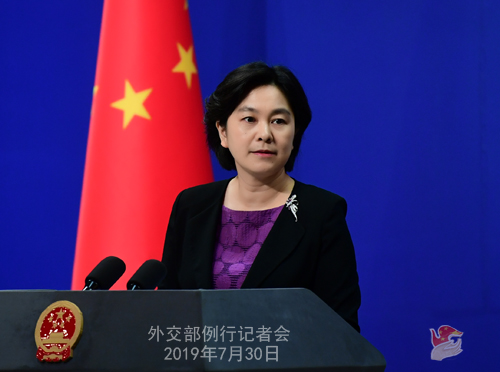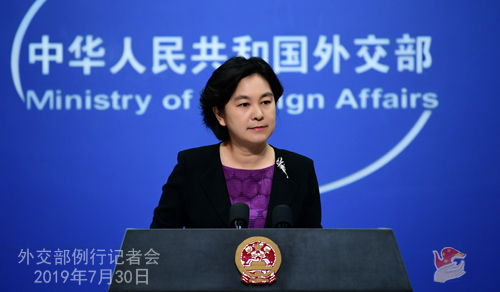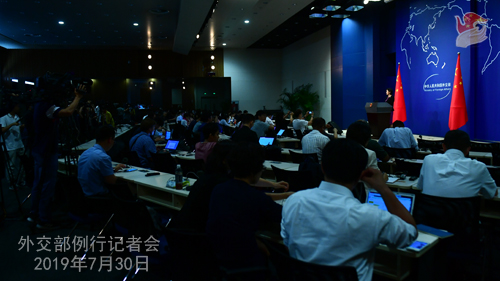| Foreign Ministry Spokesperson Hua Chunying's Regular Press Conference on July 30, 2019 |
| 2019-07-30 21:08 |
|
Q: An international colloquium was held in Beijing on July 29 themed "International Law in the Changing World: The Role of Developing Countries". Can you tell us more about it? What signals does it send to the world? A: The international colloquium themed "International Law in the Changing World: The Role of Developing Countries" was co-hosted by the Chinese foreign ministry and the Chinese Society of International Law. State Councilor and Foreign Minister Wang Yi sent a congratulatory letter to the colloquium. Vice Foreign Minister Luo Zhaohui attended and addressed the opening ceremony. President Abdulqawi Ahmed Yusuf of the International Court of Justice attended the colloquium and delivered a keynote speech. More than 300 delegates attended the colloquium. They include law officials and representatives of foreign embassies in China from over 80 countries, representatives of the United Nations, the International Tribunal for the Law of the Sea, the International Committee of the Red Cross, the Asian-African Legal Consultative Organization and other international organizations, and Chinese and foreign experts. Discussions in the colloquium focused on international law in the changing world and the role of developing countries in upholding international law. The world today is marked by changes unseen in a century. Certain country's unilateralism, protectionism and bullying practices have seriously affected international law and order. Against such a backdrop, we believe this colloquium is particularly relevant. After open and warm discussions, all sides reached the following consensus. First, the right way to develop state-to-state relations is setting and observing rules. Bullying practices and power politics will lead us nowhere. Since the end of World War II, the UN-centered international system based on international law has been a institutional guarantee to the overall peace, stability and development of the world. It has also provided a favorable environment for the sovereign independence and collective rise of developing countries. With unilateralism, protectionism and bullying practices on the rise, multilateralism and globalization are faced with headwinds, and the authority of international law and international order are undermined. The international community is focusing on one major question: where is the world heading? We all believe that we need to consolidate consensus and work together more than ever. We need to strengthen international law, respect it and follow it in dealing with international affairs. We must reject the outdated mindset of "the strong get all they want while the weak grin and bear it". Those are important experiences the world has learned from history. They meet the aspiration of people of all countries and are necessary conditions for human progress. Second, developing countries, as important global forces, have made historic contributions to international development. They now have greater strength and responsibilities to uphold justice and rules. At this colloquium, all sides agree to stick to multilateralism in international rule-making and increase the representation and say of developing countries. We agree to encourage all countries to earnestly abide by international law, uphold the basic principles of the UN Charter, safeguard the rules-based multilateral trading system with the WTO at its core, fulfill our international obligations with good will, and reject double standards and selective application of rules. We all need to act on the core values of international law to uphold fairness, justice, peaceful development and cooperation and oppose distortion and abuse of international law. We reject hegemony and power politics in the name of international law. China has all along been a staunch upholder and builder of international law. The vision of building a community with a shared future for mankind, proposed by President Xi Jinping, has been enshrined in China's Constitution. This is China's solemn commitment to peaceful development and international law. China will continue to work with other developing countries to uphold the UN-centered international order based on international law. We will jointly steer the world in the right direction of mutual respect, fairness, justice and win-win cooperation. Q: Japanese Foreign Minister Taro Kono said on July 29 that countries that are not signed parties to the Intermediate-Range Nuclear Forces Treaty (INF Treaty) are enlarging their arsenals. If this treaty is no longer effective, there must be a new framework covering the US, Russia, China, the UK and France. On the same day, US Secretary of State Pompeo said that he hopes China can be part of the strategic dialogue between the US and Russia, and that China should be part of the relevant agreement. I wonder if you have any response to that? A: China has made clear its position on the INF Treaty on many occasions. China is concerned about and opposed to the possible annulment of this treaty due to the US unilateral withdrawal from the treaty. We hope the US and Russia can resolve differences through dialogue and make efforts to preserve the treaty. It will be good for global strategic stability, regional peace and security and mutual trust between major countries. Regarding the expansion of the INF Treaty, as a bilateral treaty between the US and Russia, its expansion will lead to a series of complex issues covering political, military, legal and other areas. Many countries have concerns about it. China will not agree to it either. The so-called "new framework" proposed by Mr. Kono in its essence is not new at all. It won't help to preserve the INF Treaty. Instead, it only finds or rather gives the US new excuses for its unilateral withdrawal from the treaty. I'd like to stress that China pursues a defense policy that is defensive in nature. Our purpose to develop intermediate-range missiles is entirely self-defense. We do not intend to and will not pose a threat to any country. The real intention of the US withdrawal is to make the treaty no longer binding on itself. Bringing China into this is just an unreasonable move. China will not accept it. If Japan truly cares for regional security, it should persuade the US not to exit the treaty in the first place. Mr. Pompeo is also shifting the blames by saying China can be part of the relevant dialogue and agreement between the US and Russia. China stands for the comprehensive prohibition and complete elimination of nuclear weapons. However, nuclear disarmament should follow a basic principle, which is international recognized, that the security of all countries shall not be undermined. The US, as the largest nuclear state, has special and primary responsibilities in nuclear disarmament. The US should earnestly act on the current agreements and continue to drastically reduce nuclear arms. It should create favorable conditions for other countries to participate in nuclear disarmament negotiations instead of shifting blames to others.
Q: First question, when responding to a Hong Kong-related question in the Economic Club of Washington D.C., US Secretary of State Mike Pompeo said that protests are appropriate, and that they often see protests in the United States. He hopes the Chinese government will do the right thing and respect the agreements that are in place with respect to Hong Kong. What's your comment? What are the agreements he refers to? Second question, the Mainland Affairs Council of Taiwan said China's mainland is strengthening "one country" and weakening "two systems" in Hong Kong. Can you comment on that? Third, another round of China-US trade talks began in Shanghai today. Has it started already? Was Minister Zhong Shan part of the talks? A: On your first question, first of all, you mentioned Mr. Pompeo said that they often see protests in the US. I was wondering if he is happy to see those violent radicals using iron batons and lethal weapons to attack the police in the US, too? Maybe it will be a chance for the US to show its democracy? What do you think of that? I think Mr. Pompeo obviously failed to put himself in a right position. I'm afraid he still regards himself as the CIA chief. He said the recent violent incidents in Hong Kong are appropriate because, as you all know, they are somehow the work of the US. Let us think about what has happened. According to public reports, at the end of February and the beginning of March, the then US Consul-General in Hong Kong blatantly criticized the Hong Kong SAR government's bill amendment and the "one country, two systems" principle and interfered in Hong Kong affairs. In March, US Vice President Mike Pence met with Hong Kong opposition lobbyists. In May, Pompeo met with Hong Kong opposition and made irresponsible remarks on the amendment matter. In June, Speaker of the US House of Representatives Nancy Pelosi even called the demonstrations in Hong Kong "a beautiful sight to behold". Some members of US Congress once again proposed the Hong Kong Human Rights and Democracy Act. In July, Pence, Pompeo and Bolton met with opposition personnel. In the scenes revealed on media, we saw some American faces among the violent demonstrators in Hong Kong. We even saw the national flag of the US on some occasions. We all have this question: what role has the US played in Hong Kong recently? The US owes the world an explanation. The US has to be clear that we are talking about Hong Kong. It is China's Hong Kong. Like we stressed many times, the Chinese government will never allow any foreign forces to have a hand in Hong Kong affairs. Neither will we allow them to mess up Hong Kong. The central government firmly supports the SAR government in governing Hong Kong in accordance with law and support Hong Kong police in strictly punishing violent criminals to uphold security and stability in Hong Kong. Those who play fire will only get themselves burned. There have been so many lessons in history. We advise the US to immediately stop playing the dangerous game of pulling chestnut out of fire. On your second question, Spokesperson Yang Guang of the Hong Kong and Macao Affairs Office of the State Council has made a clear and comprehensive statement on the "one country, two systems" principle. I'd like to say this to the relevant persons you mentioned in Taiwan: only through peaceful reunification and the "one country, two systems" principle can we have a brighter future. This is what we all believe in. I'll leave your third question to the competent authority of the Chinese side. Q: A report on the DPRK media Rodong Sinmun applauded the measures taken by the Chinese government on Hong Kong. It said that no country, organization or individual has the right to interfere in Hong Kong affairs. Whoever they are, they need to respect China's sovereignty and stop interfering in Hong Kong affairs. Hong Kong affairs are purely China's internal affairs, which should be dealt with following the will of the Chinese people with no foreign interference. I wonder if you have any comment on that? A: We read that Rodong Sinmun report and commend the DPRK for speaking with the voice of justice on this issue. Like we said on many occasions, Hong Kong is China's Hong Kong. The Chinese government firmly opposes any foreign interference in Hong Kong. We have the resolve and capability to maintain Hong Kong's security and stability. We believe justice will prevail over evil.
|
 |
|


